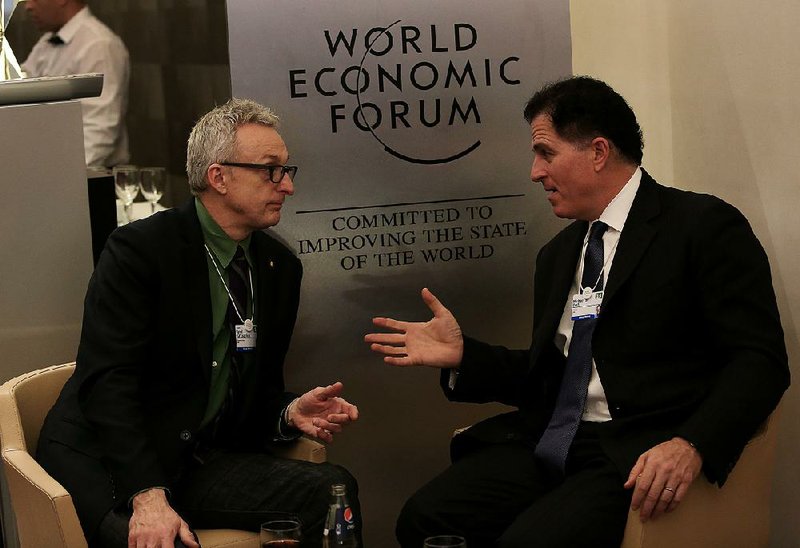SAN FRANCISCO — Slumping personal computer maker Dell is bowing out of the stock market in a $24.4 billion buyout that represents the largest deal of its kind since the recession dried up the financing for such risky maneuvers.
The complex agreement announced Tuesday will allow Dell Inc.’s management, including founder Michael Dell, to attempt a company turnaround away from the glare and financial pressures of Wall Street.
Dell stockholders will be paid $13.65 per share to leave the company on their own. That’s 25 percent more than the $10.88 the stock was going for before word of the buyout talks trickled out last month.But it’s a steep markdown from the shares’ price of $26 less than five years ago, when the company’s eponymous founder returned for a second go-round as chief executive.
Dell shares rose 15 cents to close at $13.42, indicating that investors don’t believe a better offer is likely.
Dell’s decision to go private is a reflection of the tough times facing the personal computer industry as more technology spending flows toward smart phones and tablet computers. Personal computer sales fell 3.5 percent last year, according to the research group Gartner Inc., the first annual decline in more than a decade. What’s more, tablet computers are expected to outsell laptops this year.
The shift has weakened long-time stalwarts such as Dell, fellow personal computer maker Hewlett-Packard Co., chip maker Intel Corp. and software maker Microsoft Corp.
Once Dell’s sale is finalized, its stock will stop trading on the Nasdaq Stock Market nearly 25 years after the Round Rock, Texas, company raised $30 million in an initial public offering of stock. Microsoft Corp. is helping the deal along by lending $2 billion to the buyers, which include investment firm Silver Lake.
The company will solicit competing offers for 45 days.
The IPO and Dell’s rapid growth through the 1990s turned its founder into one of the world’s richest people. His fortune is currently estimated at about $16 billion. Michael Dell, who owns nearly 16 percent stake in the company, will remain the CEO after the sale closes and will contribute his existing stake in Dell to the new company.
The deal is the largest leveraged buyout of any type since November 2007 when Alltel Corp. sold for $25 billion to TPG Capital and a Goldman Sachs subsidiary. Within a few months, the U.S. economy had collapsed into the worst recession since World War II.
Leveraged buyouts refer to deals that saddle the acquired company with the debt taken on to finance the purchase.
Like other personal computer makers, Dell has seen revenue shriveling and its stock sinking amid worries that the company might not be able to regain its technological edge.
Both Dell and its larger rival Hewlett-Packard are trying to revive their fortunes by expanding into business software and technology consulting, two niches that are more profitable than making personal computers.
The personal computer downturn has hurt Microsoft by reducing sales of its Windows operating system. As the world’s third-largest personal computer maker, Dell is one of Microsoft’s biggest customers.
By becoming a major Dell backer, Microsoft could gain more influence in the design of the devices running on a radically redesigned version of Windows that was released in late October. The closer ties with Dell, though, could poison Microsoft’s relationship with Hewlett Packard, the largest personal computer maker, and other manufacturers that buy Windows and other software.
In a statement, Michael Dell said that while the company has made progress, turning it around will be easier under private ownership.
“We recognize that it will still take more time, investment and patience, and I believe our efforts will be better supported by partnering withSilver Lake in our shared vision,” he said.
As a private company, Dell won’t have to pander to the stock market’s fixation on whether the company’s earnings are growing from one quarter to the next.
Taking the company private is a major risk, however. It will leave Dell without publicly traded shares to entice and reward talented workers or to help buy other companies.
As part of its shift toward business software and technology services, Dell already has spent $9 billion on acquisitions in the past three years.
Leveraged buyouts also require companies to earmark some of their incoming cash to reduce the debt taken on as part of the process of going private. The obligations mean Dell will have less money to invest in innovation and expansion of its business.
Information for this article was contributed by Michelle Chapman and Peter Svensson of The Associated Press.
Business, Pages 25 on 02/06/2013


